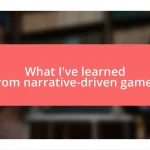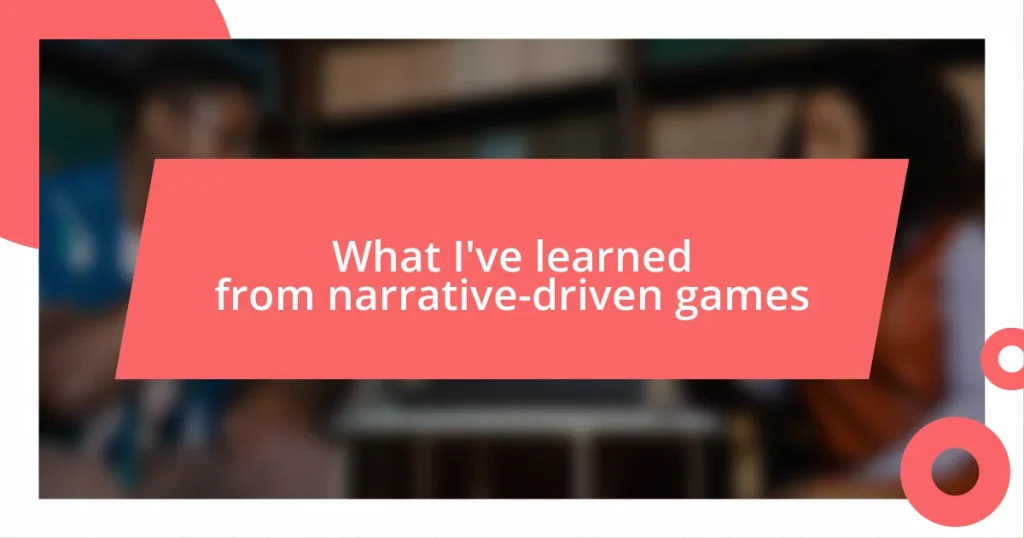Key takeaways:
- Narrative-driven games foster emotional connections and introspection, prompting players to reflect on their values through decision-making and character experiences.
- Character development and player choices enhance engagement, creating a unique bond between players and narratives as choices shape the direction and outcomes of the story.
- Lessons learned from in-game experiences can translate to real-life applications, such as navigating guilt, processing grief, and emphasizing teamwork and collaboration in personal interactions.
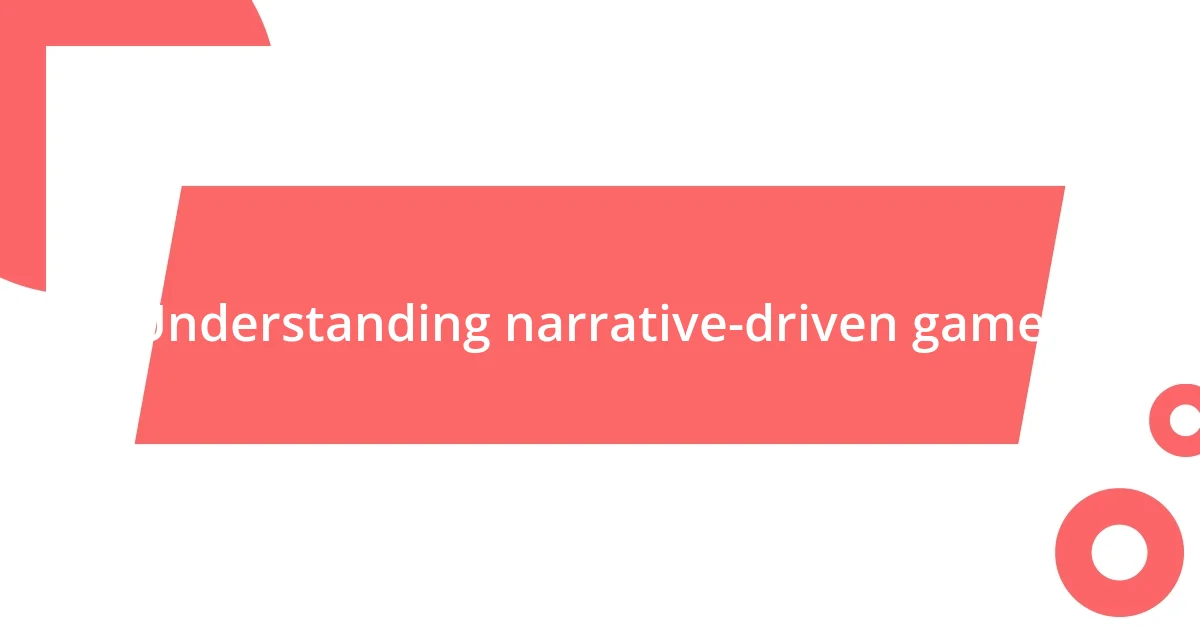
Understanding narrative-driven games
When I think about narrative-driven games, I can’t help but recall the first time I played one that truly captured my heart. The story wasn’t just there to fill space; it wove itself into the gameplay, making every choice I made feel significant. Isn’t it incredible how a well-crafted narrative can elevate a game from mere entertainment to a genuine emotional experience?
What I’ve learned is that these games often place players in the shoes of complex characters, inviting us to explore their motivations and dilemmas. I remember feeling the weight of a character’s decision as if it were my own, often grappling with feelings of empathy and regret. This immersive storytelling prompts us to ask ourselves tough questions about our values and beliefs.
Additionally, I appreciate how narrative-driven games can provide a unique sense of agency. By allowing us to influence the story’s direction, we become not just observers but active participants. Think about it: when was the last time a game made you ponder what you would do in a character’s shoes? I’ve often found myself reflecting on these choices long after the credits rolled.
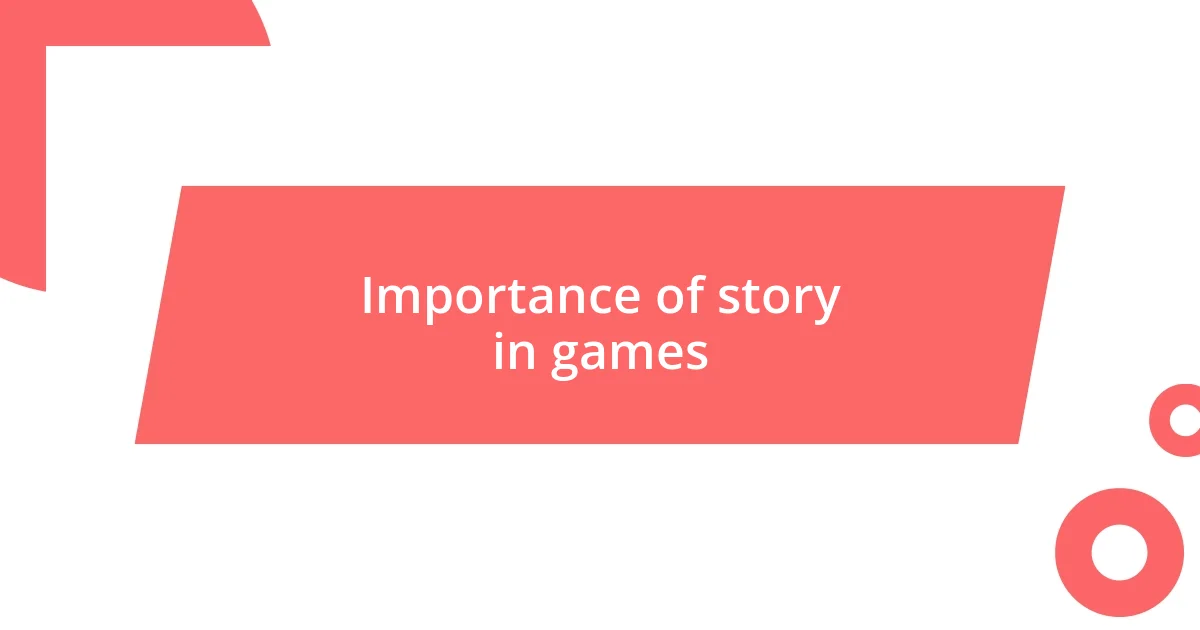
Importance of story in games
The importance of story in games cannot be overstated. I remember playing a game where the narrative wrapped around themes of friendship and sacrifice. It wasn’t just about winning; it was about the emotional journey that unfolded, making me more invested in the characters’ fates. The depth of storytelling allows players to forge connections, making each encounter feel personal and memorable.
In my experience, the best games offer a narrative that evolves based on the choices I make. This element of storytelling creates a sense of investment; I often find myself thinking about the repercussions of my actions long after I’ve put down the controller. Have you ever felt the urge to replay a game just to make different choices? That’s the power of a gripping story—it lingers, inviting us to explore alternate paths and outcomes.
Moreover, narrative-driven games can serve as a mirror to our own lives. When I faced tough decisions in a game, I couldn’t help but reflect on similar dilemmas I’d faced. This narrative engagement triggers introspection, allowing us to confront our fears and beliefs through the lens of a game world. Stories in games add a rich layer of meaning that can resonate with us deeply, making the experience not just entertaining, but transformative.
| Aspect | Significance |
|---|---|
| Emotional Connection | Stories create deep relationships with characters. |
| Player Agency | Choices shape the narrative, enhancing engagement. |
| Introspection | Narratives invite players to reflect on personal values. |
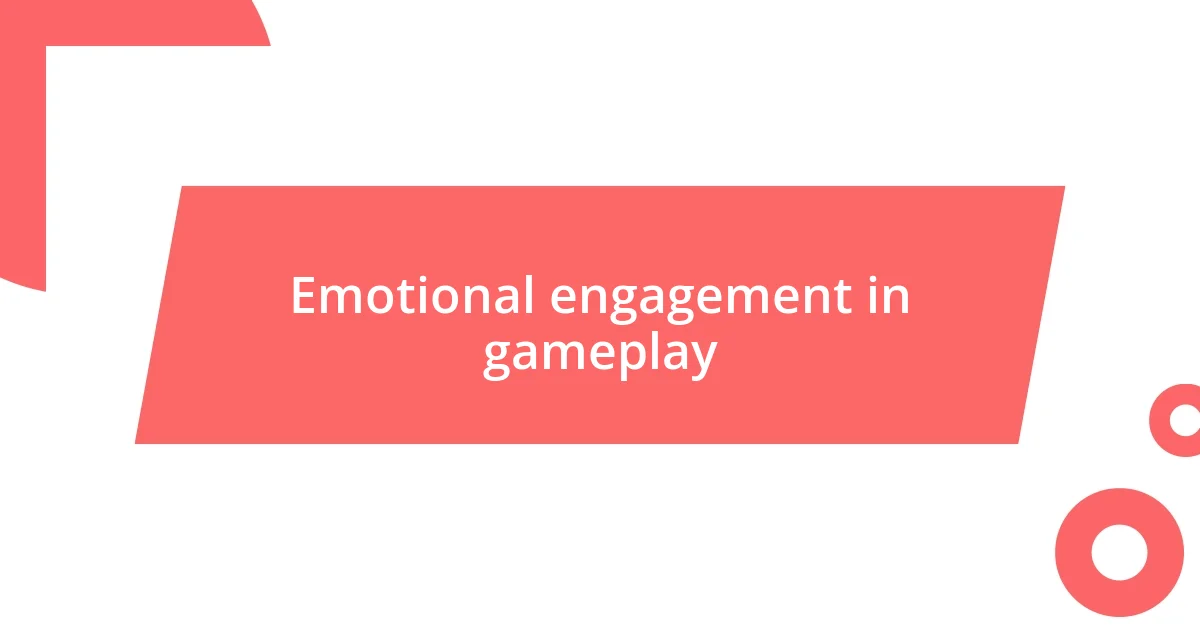
Emotional engagement in gameplay
Experiencing emotional engagement in gameplay has profoundly impacted how I connect with the interactive stories I encounter. I vividly recall playing a game where I had to make a gut-wrenching decision to save one character at the expense of another. The moment felt like a stab to my heart, making me question what defines loyalty and sacrifice. It’s moments like these that remind me how deeply narrative-driven games can weave emotions into the fabric of gameplay, making our choices feel monumental.
Here are a few elements that stand out when it comes to emotional engagement:
- Empathy Development: Characters’ struggles often mirror real-life challenges, creating a bond between players and the narrative.
- Moral Dilemmas: The choices we face provoke intense feelings, forcing us to grapple with right and wrong in a way that feels profoundly personal.
- Memory and Reflection: I find myself reminiscing about the emotional arcs long after finishing a game, sometimes sharing these experiences with friends or pondering them in my daily life.
The blend of storytelling and gameplay not only entertains but enriches our emotional landscapes, urging us to feel more deeply.
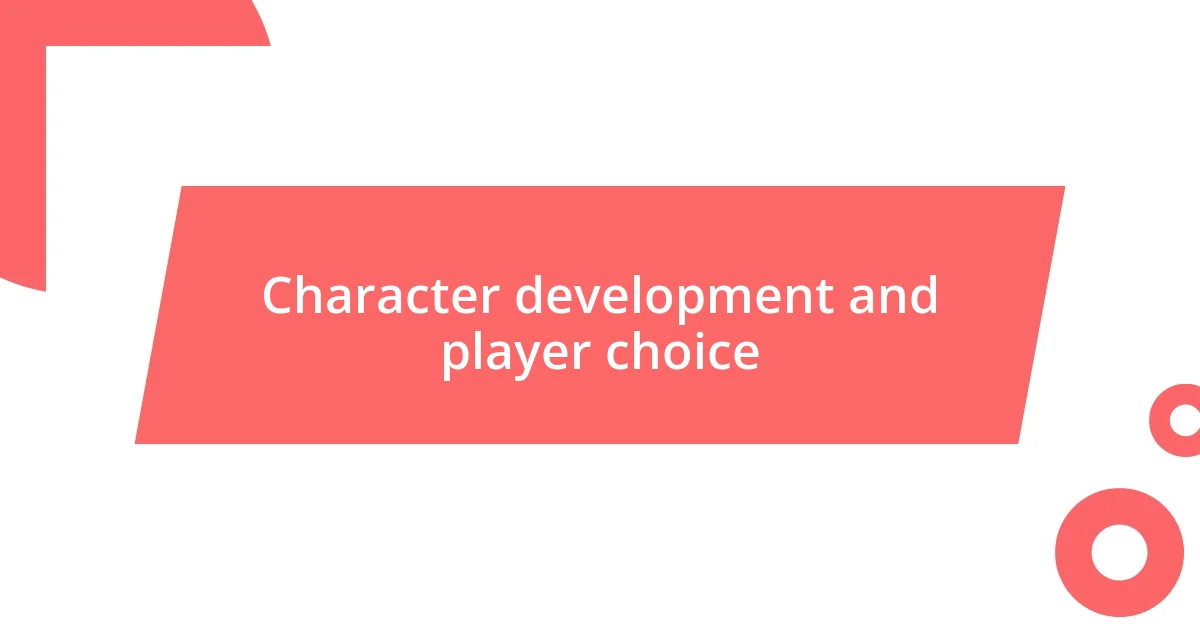
Character development and player choice
Character development is an essential component of narrative-driven games, shaping not just the story but also how we experience our gameplay. I remember a moment playing a role-playing game where my choices influenced a character’s growth from a naive rookie to a heroic leader. Each decision felt monumental; it was exhilarating to see the character evolve and reflect the very choices I made, fostering a unique bond with them. Have you ever felt that connection when a character’s fate rested in your hands?
Player choice can significantly enhance immersion and emotional investment. While playing a game, I had a pivotal choice that altered not just the storyline but the relationships between characters. It made me ponder how my decisions reflect my values in real life. In that moment of decision, I realized I was not just playing a game; I was actively participating in a living narrative where each action shaped my journey. Doesn’t it feel empowering to know that your choices carry weight?
Ultimately, the intertwining of character development and player choice invites deep engagement and reflection. I often find myself revisiting these games, drawn back not just by nostalgia but by the desire to explore different paths and outcomes. It’s like returning to a beloved book and asking, “What if I did this differently?” This dynamic keeps the narrative fresh and allows us to see different facets of character growth, making each playthrough a unique experience.

Themes and messages in narratives
When I immerse myself in narrative-driven games, I often encounter themes that resonate deeply with life’s complexities. For instance, in one game, the main character struggled with identity and the concept of family ties. Reflecting on this, I realized how the narrative encouraged me to examine my own relationships. Have you ever found yourself questioning what defines family after a game? It’s fascinating how these virtual stories can prompt such profound introspection.
Another compelling theme I’ve noticed is the impact of choices on the greater community. There’s a game where every decision I made affected the world around me, showcasing the repercussions of individual actions. I remember a pivotal moment where I had to choose between personal gain and the welfare of a town. This not only pulled at my heartstrings but also made me ponder the broader implications of my decisions. Isn’t it interesting how a game can instill a sense of responsibility that spills over into real life?
Finally, I often reflect on the theme of redemption woven throughout many narratives. I played a game that followed a character seeking forgiveness for past mistakes. This journey was not just about the character’s growth; it mirrored my own experiences of seeking forgiveness and learning from past errors. How many times have we sought redemption in our lives, much like those characters? These narratives remind us that while we falter, there’s always room for growth and renewal, encapsulating the beauty of human experience.
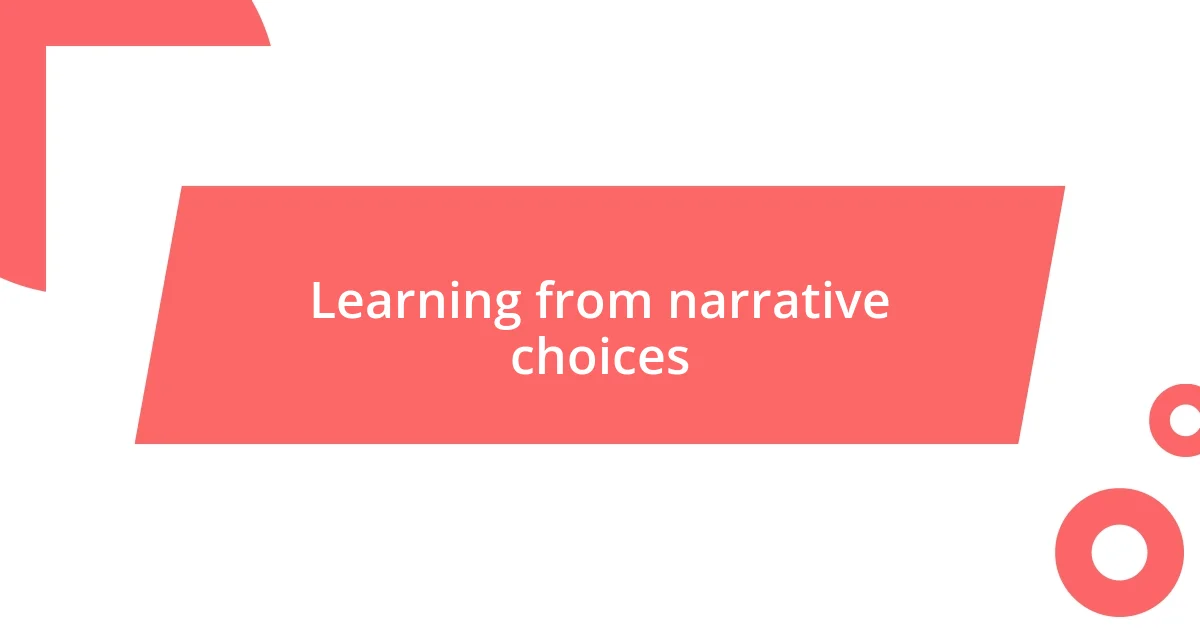
Learning from narrative choices
Learning from narrative choices often feels like diving into a sea of possibilities, where every decision can lead to vastly different outcomes. I recall a moment in a game where I had to choose whether to betray a comrade for personal gain. As I hovered over the choice, my heart raced—would I prioritize my own ambition or nurture the bonds I had forged? This dilemma echoed beyond the screen, prompting me to consider how choices shape not only my virtual journey but also my real-world relationships and integrity.
There’s something profoundly reflective about the consequences of our decisions in these narratives. I once played a game that presented me with a series of tough moral choices, each one affecting the narrative thread and the fate of entire communities. I vividly remember agonizing over a decision that would either save a village or condemn it to hardship. In that moment, I realized how connected I felt to the virtual people I was impacting. Isn’t it remarkable how these in-game choices can mirror our everyday dilemmas, pushing us to think about the greater good?
Ultimately, it’s the emotional weight carried by these choices that leaves a lasting impression. I find that revisiting games offers me a chance to rectify my past decisions, almost like a life lesson wrapped in an engaging story. Just the other day, I replayed a classic where I initially chose the path of selfishness. As I navigated through it again, I found myself making decisions that prioritized compassion and cooperation. It struck me how powerful it is when our choices allow us to evolve, both in-game and in life. Have you experienced that shift in perspective when re-exploring your favorite narratives?

Applying lessons to real life
Experiencing the rich narratives in games has often led me to apply their lessons in unexpected ways. For example, during one playthrough, I encountered a character facing guilt over a past action. I couldn’t help but reflect on moments in my own life where I needed to confront my own mistakes. It became clear to me that embracing vulnerability and acknowledging my missteps can foster deeper connections with those around me. Have you ever found how exploring guilt through a digital lens can spark a conversation within yourself?
Another striking moment came when I engaged with a plot that revolved around loss and healing. The character’s journey through grief mirrored my own experiences after losing a loved one. I was struck by the way the game crafted a safe space for me to process my feelings, allowing me to confront my grief rather than shy away from it. Don’t you think that sometimes, games can provide a unique form of therapy, letting us tackle our emotions without the weight of real-world repercussions?
I also find that the collaborative elements of many narrative-driven games emphasize teamwork and trust, which resonate deeply in both gaming and life. There was a time when I played a multiplayer narrative where strategic cooperation was essential for survival. The experience highlighted how working together with others can lead to shared triumphs. This reinforced my belief in the value of collaboration, whether in my professional life or my personal connections. How often do we overlook the strength found in unity while navigating our day-to-day challenges?



